Facebook is getting back to its roots as a college-focused social network. The company announced today the launch of a new social networking platform, Facebook Campus, which offers college students a private place to connect with classmates, join groups, discover upcoming campus events, get updates from their school’s administration and chat with other students from their dorm, clubs or any other campus group.
The new platform requires a school email address (@.edu) to join and will live within a dedicated section of the Facebook app. It will be accessible from a tab at the bottom of the screen or from the “More” menu alongside sections like Watch, Dating, Gaming, News, Marketplace and others.
“We wanted to create a product where it was easy for classmates to meet each other, foster new relationships and also easily start conversations,” explains Facebook Campus Product Manager Charmaine Hung. “And we really think that Campus is more relevant than ever right now. With COVID-19, we see that many students aren’t returning to campus in the fall. Now, classes are being held online and students are trying to react to this new normal of what it’s like to connect to clubs and organizations that you care about, when you’re not together,” she added.
More broadly, Facebook likely wanted to address its “teen problem,” and Facebook Campus is its solution.
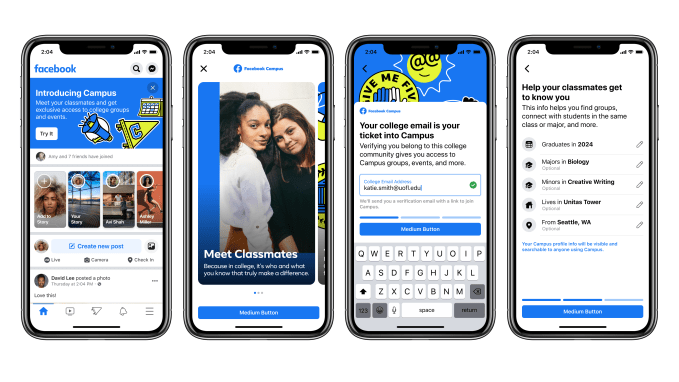
Facebook, according to reports, has been losing its grip on the younger demographic, as they’ve shifted their attention to other social apps, like YouTube, Snapchat and Instagram. According to a 2018 study from the Pew Research Center, only 51% of U.S. users ages 13 through 17 said they used Facebook, down from 71% who said the same in 2015. Meanwhile, a 2019 survey by Edison Research indicated that Facebook had lost 15 million users since 2017, with the biggest drop coming from the 12 to 34-year-old group.
Facebook Campus is built to bring these users back by offering a more exclusive place for private networking within Facebook. It’s similar, in some ways, to Facebook’s effort to address the needs of corporate users with Facebook Workplace. Instead of being new ideas for social networking, these platforms leverage Facebook’s existing technology, like News Feed and Groups, to deliver solutions for particular demographics.
At launch, Facebook Campus is only available at around 30 colleges and universities across the U.S. (see full list below), but the company plans to expand over time.
Some of the colleges have a deeper partnership with Facebook and have signed up to publish updates and news to their students’ Facebook Campus feed, as well. In these cases, the college or university may encourage various student leaders to join the network, too.
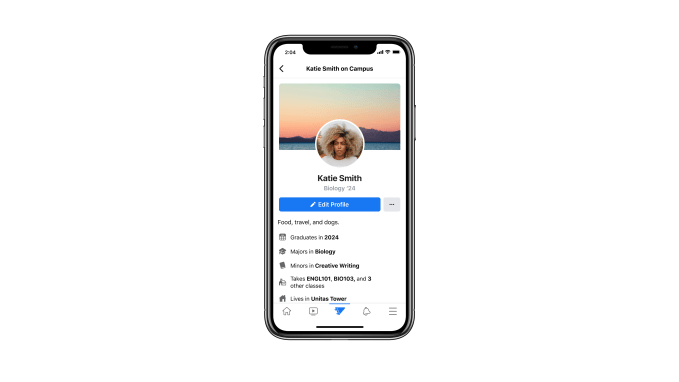
Facebook will market the new app both within its app and offline. Students may be prompted to join Campus through a prompt in News Feed if Facebook has enough data to indicate they’re likely a student at a supported college. For example, if a Facebook user regularly visited a supported university’s Facebook Page, Facebook may display the Facebook Campus sign-up prompt. There are also student-led incentive programs where students who increase enrollment are rewarded with Facebook Campus swag, like t-shirts and towels.
In addition to requiring a .edu email address, Facebook Campus requires a graduation year — and it will need to be no more than five years out from the present. For now, Facebook will not remove Campus users after graduation, but the way those users participate may be modified in the future. The company says alumni play a large role in college communities, but it’s still evaluating how to best incorporate them in the product further down the road. The pilot will help Facebook with some of these decisions, but nothing is yet set in stone.
After signing up, students create their Facebook Campus profile. While this is linked on the back end to the student’s main Facebook profile, it lets them add college-specific details that won’t automatically appear anywhere else on Facebook. Here, Campus users can add their graduation year, dorm, major and minor, classes they’re taking, hometown, Instagram profile and more.
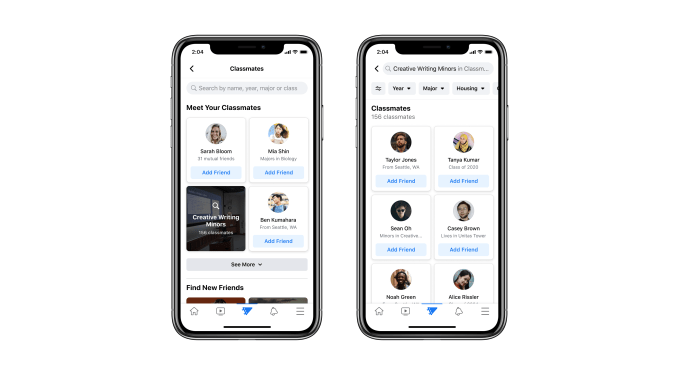
This information can only be viewed by other Facebook Campus users who attend the same school (unless those users were already blocked on Facebook). It also helps power Campus’ student directory, where Facebook Campus users can search students by name, year, major or class, or browse to find classmates to add as friends, including those who are in their same dorm or clubs.
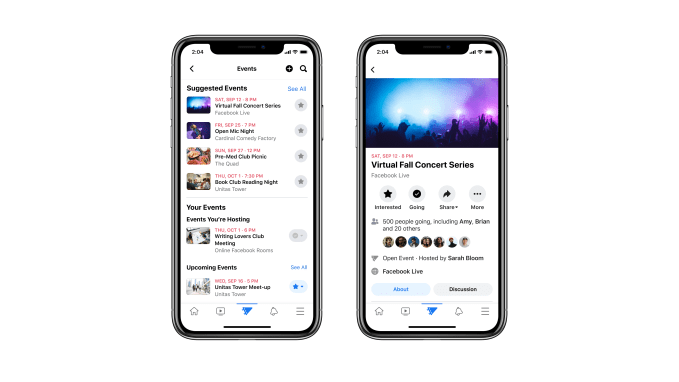
Within Facebook Campus, students can also discover and join Groups and Events for their school. These can be those associated with official student clubs or Greek organizations, those associated with a particular dorm or even those just focused on a particular interest, like photography, cooking, writing, hiking, etc. Students can create buy/sell groups or roommate search groups, too, or anything else not in violation of Facebook’s terms.
These groups and events essentially function like those on Facebook itself, with the exception being that they can only be viewed, joined and accessed by students.
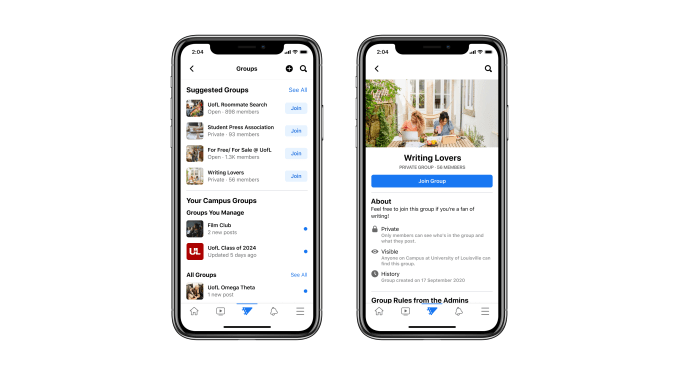
Facebook Campus also has its own private Chat section, which is kept separate from Facebook and Messenger. These group chats work a little differently, as users don’t actually have to find and invite members. Instead, students in a particular group can opt to join its associated chat, if they choose.
All updates from your groups, clubs and events are in the Facebook Campus News Feed. But unlike on Facebook proper, students can’t post to their personal profile within Campus. They can only post to groups, events or chats.
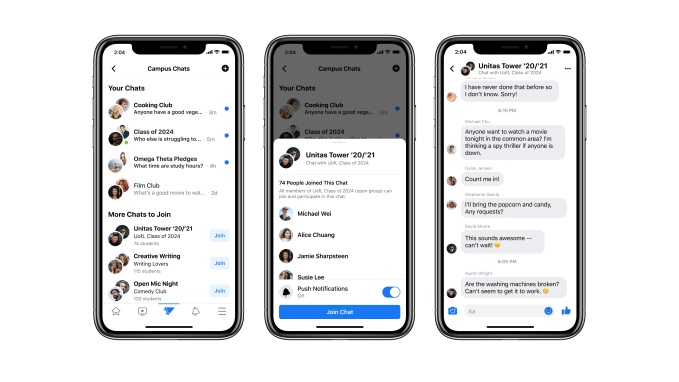
Facebook says this decision helps cut down on spam and allows users to focus their energy on engaging with smaller communities they’re involved with.
A small handful of universities have already partnered with Facebook to distribute announcements to their Facebook Campus channel for their students to see. However, any school can choose to opt-in to this feature at launch.
At launch, the following universities and colleges will support Facebook Campus:
Benedict College; Brown University; California Institute of Technology; College of William & Mary; Duke University; Florida International University; Georgia Southern University; Georgia State University; Johns Hopkins University; Lane College; Lincoln University (Pennsylvania); Middlebury College; New Jersey Institute of Technology; Northwestern University; Rice University; Sarah Lawrence College; Scripps College; Smith College; Spelman College; Stephen F. Austin State University; Tufts University; University at Albany – State University of New York; University of Hartford; University of Louisville; University of Pennsylvania; University of Wisconsin-Eau Claire; Vassar College; Virginia Tech; Wellesley College; and Wesleyan University.
While Facebook’s early days saw it targeting Ivy League schools, the company says these first Facebook Campus schools were selected for diversity’s sake. That is, diversity of the student population, diversity of geography and diversity of school specialties (like liberal arts). They also represent a mix of public and private schools.
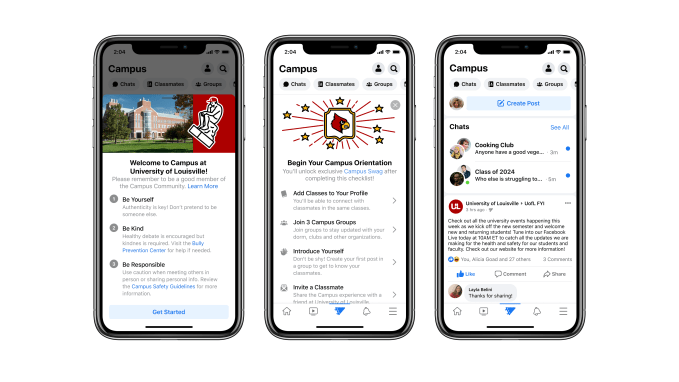
Facebook Campus, notably, won’t include advertising in its Feed. But it will support Facebook’s advertising business. Advertisers won’t be able to specifically target Facebook Campus users, but they can target users by interest — even if the only place the user indicated they had that interest was within Campus. For example, a user who joined a cooking club in Facebook Campus could be targeted by an advertiser looking to reach users interested in cooking.
Hung said Facebook hasn’t tested Facebook Campus before today, even with small groups. Instead, this launch is considered a pilot for the new experience. The company did spend time conducting roundtables with universities and with student groups to gain product insight and feedback, however.































Comment